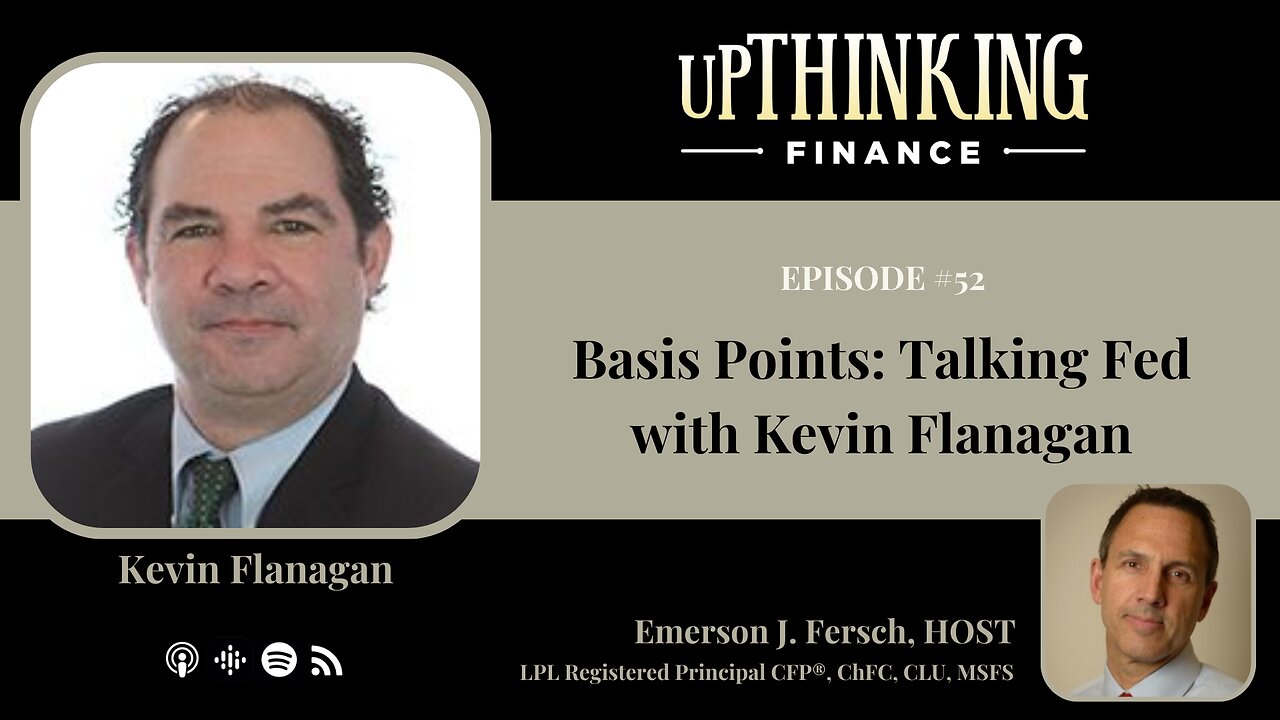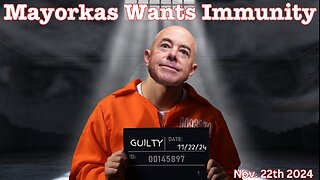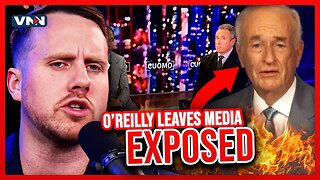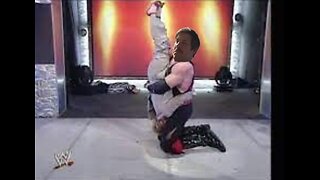Premium Only Content

Basis Points: Talking Fed with Kevin Flanagan, Ep #52
Kevin Flanagan started his career as a Fed watcher i.e. money market economist working on the trading floor. As a fixed-income strategist, he looks at things from a broad perspective because numerous things impact the bond market—economics, geopolitics, elections, etc. All play a role in how the bond market and interest rates are developed.
He found it fascinating that you could look at the past and present to gain insight into the future. Kevin joins me in this episode of UPThinking Finance™ to shed some light on this confusing topic.
================================
LISTEN IF YOU ARE INTERESTED IN…
[1:59] The “new” old-rate regime
[8:36] When the Fed’s role shifted
[14:51] Politics playing a role in policy
[16:55] Current impacts on inflation
[21:55] The impact of foreign money
[24:50] What will happen with US debt?
[28:40] The performance of the municipal market
[30:45] Where Kevin sees the bond market headed
[32:47] The connection between the 10-year and gold
[35:02] How Kevin got into the fixed-income arena
=================================
The “new” old-rate regime
Before the financial crisis, double-digit interest rates did exist. After some time, we nestled into a 3–5% range. From 2010–2020 there were even negative rates. That period was abnormal. But because of recency bias, we’ve forgotten that what we’re seeing now is closer to a “normal” level. We’re moving back to normalcy. We likely can’t return to the pre-covid levels of interest rates. There’s also a generation of advisors and investors who have to be reeducated about interest rates.
The volatility in the treasury market at the levels we’ve witnessed has to do with the uncertainty with interest rates. It’s the uncertainty that is new to the bond market. And the more open the Fed is with communication, the more openings there are for misinterpretation. The bottom line is that things can change very quickly. We can’t rely on what’s worked and must pivot and adapt.
When the Fed’s role shifted
It’s no secret that the main driver for the prices of the equity markets is the movement of the Fed. Bond guys like to say “Rates make the world go round.” Everything starts with interest rates. And who sets interest rates? The Federal Reserve.
As things have evolved in the bond market, there was always a clamoring for the Fed to be more open. The process of open communication has evolved deliberately. The Fed now gives a policy statement, press conference, and summary of economic projections.
Kevin believes there are three people you need to watch when the Fed makes its announcements—The Chairman, the Vice Chairmen, and the President. They speak on behalf of the Fed and policy. They may not always be the ones getting the media attention.
For example, a Fed Governor is a voting member of the Federal Open Market Committee. One of the governors, Christopher Waller, was on the hawkish side when the Fed started raising rates.
When he changed his narrative, it added to the momentum of the market expecting a reversal toward rate cuts. The market rallied in the 4th quarter and got ahead of itself. The validation never came. The economy and labor markets are proving more resilient than expected and inflation is stuck in the mud. Everything is interrelated and important.
Kevin feels that Powell is itching to cut rates. But they need a reason to do so. If that reason comes, the Fed will cut rates, regardless of it being an election year.
Understanding outside impacts on inflation
Why is the economy resilient? Why is there still inflation? Part of it is because there’s still a lot of money floating around. The amount of government stimulus that came post-covid was enormous. The US is running in a $2 trillion deficit because of government spending. That can’t be dismissed as a factor.
How do elections impact inflation and the movement of the Fed, if at all? Where does Kevin see the bond market headed? Listen to hear Kevin’s expert opinion!
Kevin Flanagan is not affiliated with or endorsed by LPL Financial or Capital Investment Advisers.
Securities and Advisory services offered through LPL Financial. A registered investment advisor. Member FINRA & SIPC.
The financial professionals associated with LPL Financial may discuss and/or transact business only with residents of the states in which they are properly registered or licensed. No offers may be made or accepted from any resident of any other state.
-
 LIVE
LIVE
Wendy Bell Radio
4 hours agoMAYORKAS WANTS IMMUNITY
11,962 watching -
 LIVE
LIVE
Vigilant News Network
13 hours agoBill O’Reilly Drops METEOR News Story, Leaves Panel Speechless | The Daily Dose
1,957 watching -
 LIVE
LIVE
Jeff Ahern
1 hour agoFriday Freak Out with Jeff Ahern (6am Pacific)
195 watching -
 1:25:27
1:25:27
Game On!
9 hours ago $8.38 earnedJameis Winston and the Browns UPSET the Steelers in a blizzard!
13K1 -
 12:59
12:59
Film Threat
15 hours agoGLADIATOR II EARLY REVIEW | Film Threat Reviews
16.6K3 -
 11:22
11:22
IsaacButterfield
1 day ago $2.88 earnedThe Shocking Truth About Fat Kids! (Ozempic For 6 year olds)
19.3K18 -
 1:02:48
1:02:48
PMG
1 day ago $7.63 earned"Missiles FIRED! Russia Hit By Ukraine!!! IS THIS WWIII?!"
18.9K2 -
 10:34
10:34
justintech
21 hours ago $17.35 earnedBest Gaming PC Under $1000! - In 2024
64.4K8 -
 9:34
9:34
Dr David Jockers
18 hours ago $17.71 earnedThe Shocking Truth About Butter
123K7 -
 9:05
9:05
Bearing
1 day agoJaguar's Woke New Ad is SHOCKINGLY Bad 😬
54.1K107